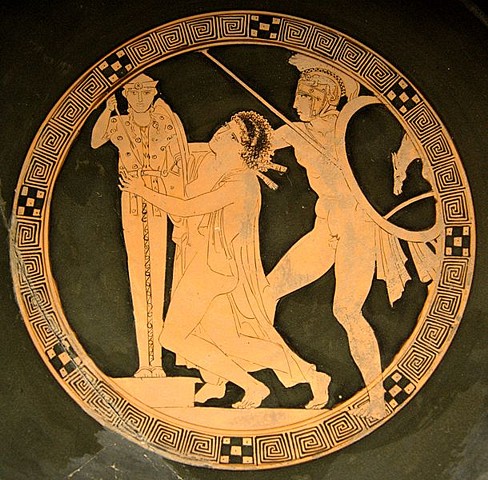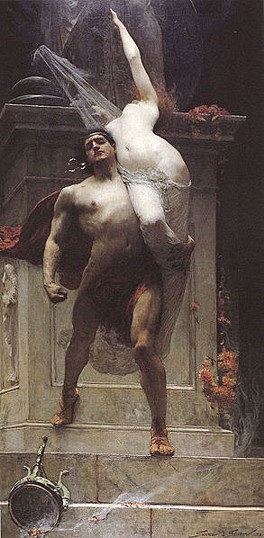Lessico
Licofrone di Calcide

Aiace
rapisce Cassandra - o Alessandra
circa 440-430 aC - Museo del Louvre - Parigi
Poeta tragico greco d'età ellenistica (nato circa nel 320 aC). Lavorò ad Alessandria, sotto Tolomeo Filadelfo, come ordinatore della Biblioteca del Museo.
La sua fama come tragediografo fu grandissima, ma di lui si conosce una
sola opera intera, l'Alessandra, lunghissimo monologo di 1474 trimetri
giambici, in cui uno schiavo riferisce le profezie fatte da Cassandra
(Alessandra) quando Paride salpò da Troia![]() per la Grecia.
per la Grecia.
Licofrone
Licòfrone
di Calcide, Λυκόφρων, IV secolo aC, fu un
poeta greco, uno dei poeti tragici della Pleiade: gruppo di sette poeti
tragici greci, vissuti nel sec. III aC all'epoca di Tolomeo Filadelfo e di
Tolomeo Filopatore, così chiamati dai grammatici alessandrini per analogia
con le sette stelle più brillanti delle Pleiadi![]() e perciò noti in epoca
moderna come Pleiade alessandrina, per distinguerli da quelli della Pléiade
francese. Conosciamo il nome di cinque di essi (Licofrone di Calcide, Filico
di Corcira, Omero di Bisanzio, Sositeo e Alessandro Etolo), il titolo di una
tragedia di Alessandro, I giocatori di
astragali, e una tragedia di Licofrone, l'Alessandra.
e perciò noti in epoca
moderna come Pleiade alessandrina, per distinguerli da quelli della Pléiade
francese. Conosciamo il nome di cinque di essi (Licofrone di Calcide, Filico
di Corcira, Omero di Bisanzio, Sositeo e Alessandro Etolo), il titolo di una
tragedia di Alessandro, I giocatori di
astragali, e una tragedia di Licofrone, l'Alessandra.
Non si hanno molte
notizie sulla vita di Licofrone né sulle sue opere. Secondo Suda![]() , l'enciclopedia storica
bizantina del X secolo, Licofrone era nato a Calcide
, l'enciclopedia storica
bizantina del X secolo, Licofrone era nato a Calcide![]() , in Eubea, attorno al
330 aC da Socle, Σωκλῆς, ed
era stato adottato dallo storico Lico di Reggio, una delle fonti delle sue
opere. Gli vengono attribuiti venti drammi e, sia pure con qualche riserva, l'Alessandra,
Ἀλεξάνδρα, unica
opera pervenutaci oltre a qualche altro frammento.
, in Eubea, attorno al
330 aC da Socle, Σωκλῆς, ed
era stato adottato dallo storico Lico di Reggio, una delle fonti delle sue
opere. Gli vengono attribuiti venti drammi e, sia pure con qualche riserva, l'Alessandra,
Ἀλεξάνδρα, unica
opera pervenutaci oltre a qualche altro frammento.
Il
filologo bizantino Giovanni Tzetzes![]() , Ἰωάννης Τζέτζης, XII secolo, gli attribuì
64 o 46 drammi oltre la sistemazione, su incarico di Tolomeo II Filadelfo,
delle opere dei poeti comici nella biblioteca di Alessandria. Da questa
attività trasse spunto per la redazione del trattato Sulla
commedia, Περὶ κωμῳδίας, in oltre nove libri,
andato perduto.
, Ἰωάννης Τζέτζης, XII secolo, gli attribuì
64 o 46 drammi oltre la sistemazione, su incarico di Tolomeo II Filadelfo,
delle opere dei poeti comici nella biblioteca di Alessandria. Da questa
attività trasse spunto per la redazione del trattato Sulla
commedia, Περὶ κωμῳδίας, in oltre nove libri,
andato perduto.
L'esegesi dell'Alessandra non aiuta a individuare esattamente il suo autore né a inquadrarlo in un preciso spazio temporale, anzi ha posto e pone domande a cui sono state date risposte parziali e non esaustive. « Troppo antico appare per esserne l'autore il poeta delle Pleiadi, di cui è notizia nel Lessico di Suida; inafferrabile un secondo Licofrone, spettatore della potente ascesa di Roma. »
La lunga profezia di Alessandra sulla guerra di Troia e sulle conseguenze della guerra sui protagonisti che la animarono, la successione dei vaticini in cui si sviluppa il dramma, non sciolgono i dubbi sulla datazione dell'opera né sull'identità del suo autore. Per esempio, Alessandra profetizza che i discendenti romani dell'eroe troiano Enea avrebbero dominato il mondo; senonché nella prima metà del III secolo aC, epoca in cui visse Licofrone, Roma non era ancora una potenza tale da rendere verosimile la profezia della futura grandezza da parte di un autore greco.
Licofrone usa la metafora e gli enigmi, profondo conoscitore della mitologia parla attraverso essi; ama l'iperbole descrittiva, la ricercatezza stilistica, l'invenzione letteraria, lo stupefacente che impressiona, a volte oltre misura. Il suo stile quasi sempre oscuro si allontana dalla pacata eleganza alessandrina. « Il suo fine non è quello di offrire un messaggio di pura bellezza, quanto di stupire, travolgere, disorientare il lettore. » Tutto questo, assieme al suo silenzio su avvenimenti tolemaici, concorre a rendere problematica la sua individuazione con il poeta della Pleaide e la avvicina a un diverso Licofrone di cui però sfugge l'immagine. La sua metafora attinge al mondo animale per esaltare le caratteristiche fisiche o psichiche dei personaggi che descrive rendendoli al tempo stesso ambigui e difficili da identificare. Licofrone fu un autore difficile ed erudito che si rivolgeva a un pubblico colto, capace di decifrare le sue metafore e i suoi enigmi.
Alessandra - Il poema, un lungo monologo epico-lirico in trimetri giambici comprendente un prologo e due epiloghi, narra le profezie di Alessandra, figlia di Priamo, la più bella fra le sue figlie. Nell'opera si colgono tre momenti narrativi: il primo descrive il rapimento di Elena e la guerra che portò alla distruzione di Troia, il secondo, il più importante dal punto di vista storico, descrive le peripezie del ritorno in patria dei Greci, la loro dispersione nell'occidente e la sua colonizzazione, il terzo esamina le cause dell'odio tra l'Europa e l'Asia. Quest'ultima parte fa anche una descrizione etnogeografica delle differenze che oppongono i due continenti in una visione pessimistica dei loro rapporti.

Ajax
raping Cassandra - or Alexandra
by Solomon Joseph Solomon - 1886
Lycophron was a Hellenistic Greek tragic poet, grammarian, and commentator on comedy, to whom the poem Alexandra is attributed (perhaps falsely). He was born at Chalcis in Euboea, and flourished at Alexandria in the time of Ptolemy Philadelphus (285-247 BC). According to the Suda, the massive tenth century Byzantine Greek historical encyclopaedia, he was the son of Socles, but was adopted by Lycus of Rhegium. He was entrusted by Ptolemy with the task of arranging the comedies in the Library of Alexandria; as the result of his labours he composed a treatise On Comedy. Lycophron is also said to have been a skilful writer of anagrams.
The poetic compositions of Lycophron chiefly consisted of tragedies, which secured him a place in the Pleiad of Alexandrian tragedians. The Suda gives the titles of twenty tragedies, of which a very few fragments have been preserved. Among these, a few well-turned lines show a much better style than the Alexandra. Lycophron's tragedies are said to have been much admired by Menedemus of Eretria, although Lycophron had ridiculed him in a satyr play.
Alexandra - One poem traditionally attributed to him, Alexandra or Cassandra, has been preserved in its complete form, running to 1474 iambic trimeters. It consists of a prophecy uttered by Cassandra, and relates the later fortunes of Troy and of the Greek and Trojan heroes. References to events of mythical and later times are introduced, and the poem ends with a reference to Alexander the Great, who was to unite Asia and Europe in his world-wide empire. The style obtained for the poem's author, even among the ancients, the title of "obscure"; one modern scholar says the Alexandra "may be the most illegible piece of classical literature, one which nobody can read without a proper commentary and which even then makes very difficult reading." The poem is evidently intended to display the writer's knowledge of obscure names and uncommon myths; it is full of unusual words of doubtful meaning gathered from the older poets, and long-winded compounds coined by the author. It was probably written as a show-piece for the Alexandrian school, rather than as straight poetry. It was very popular in the Byzantine period, and was read and commented on very frequently; the manuscripts of the Cassandra are numerous. Two explanatory paraphrases of the poem survive, and the collection of scholia by Isaac and John Tzetzes is very valuable (much used by, among others, Robert Graves in his Greek Myths).
Some modern studies have concluded that the Alexandra cannot be the work of the third-century BC author; in one scholar's summary of this view, the poem was: ...written in the immediate aftermath of the victory of Flamininus at Cynoscephalae over Philip V of Macedon in 197/6 BC. The author, whose true name and place of origin are probably concealed beneath the impenetrably enigmatic biographical tradition concerning "Lycophron," probably used the name, and some of the literary substance, of Lycophron, not in emulation, but as an ironic reminiscence of the earlier writer, who had combined the practice of tragedy and the elucidation of comedy. Only on this assumption of a deliberate pseudepigraphon can the full irony of his work be appreciated.
The question turns on passages in the poem (1226-1280; cf. 1446-1450) that describe Roman dominance in terms that only fit the situation after the Second Macedonian War. Cassandra prophesies that her Trojan ancestors' descendants "shall with their spears win the foremost crown of glory, obtaining the sceptre and monarchy of earth and sea" and elaborates with allusions to the course of historical events. Some scholars, such as Stephanie West, regard these passages as interpolations and defend the attribution of the bulk of the poem to Lycophron the tragic poet.